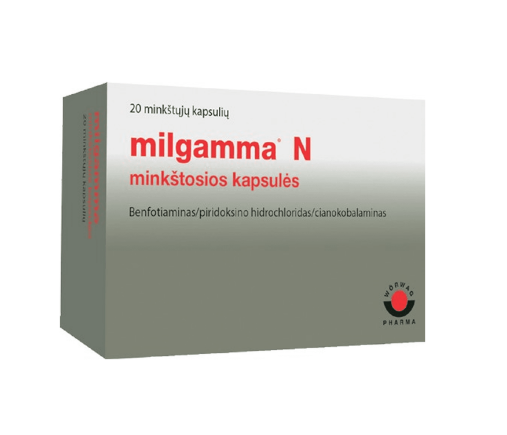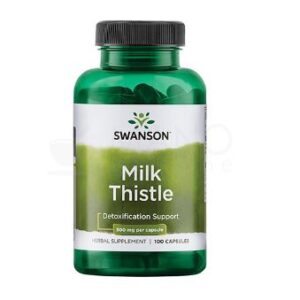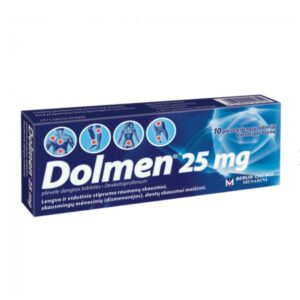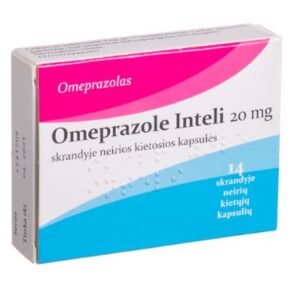What are Milgamma N Capsules and What are They Used For?
Milgamma N capsules are used for the treatment of:
- Nervous system diseases of various origins
- Inflammatory neurological diseases (neuritis)
- Neurological diseases with a pain syndrome (neuralgia)
- Neurological diseases resulting from nerve damage due to diabetes, alcoholism, and others
- Migraine
- Painful muscle sprains (strains)
- Radicular syndromes (irritation of nerve roots in the spine)
- Cervical vertebrae syndrome
- Shoulder-hand syndrome
- Shingles
- Facial nerve paralysis
- Prolonged healing processes in the elderly
2 BEFORE TAKING MILGAMMA N CAPSULES
Do not take Milgamma N capsules:
- If you suspect hypersensitivity (allergy) to thiamine, benfotiamine, pyridoxine hydrochloride, cyanocobalamin, or any of the excipients in Milgamma N capsules.
- If you are pregnant or breastfeeding.
Take special care with Milgamma N capsules:
Prolonged intake (over 6 months) of Milgamma N capsules can cause peripheral nerve dysfunction.
Taking other medicines:
Please inform your doctor or pharmacist if you are taking or have recently taken any other medicines, including those obtained without a prescription. This is particularly important if you are taking or have taken the following medicines:
- Levodopa (used for Parkinson’s disease)
- Isonicotinyl hydrazine (INH) and cycloserine (for tuberculosis)
- D-penicillamine (for rheumatoid arthritis)
- Estrogen-containing contraceptives for long periods of treatment
- 5-fluorouracil (for treating cancers)
Taking Milgamma N capsules with food and drink:
Avoid alcohol as it reduces the effectiveness of the treatment. Take the capsules after meals.
Pregnancy and lactation:
Inform your doctor if you are pregnant, think you might be pregnant, or are breastfeeding. The use of Milgamma N capsules during pregnancy and lactation is not recommended due to the product’s vitamin B6 content (90 mg/capsule).
Driving and using machines:
No special precautions are necessary.
Important information about some of the ingredients of Milgamma N capsules:
This medicine contains glycerol. In high doses, the glycerol content may cause headache, upset stomach, and diarrhea. This medicine also contains sorbitol. If you have been told by your doctor that you have intolerance to certain sugars, consult your doctor before taking this medicine.
3 HOW TO TAKE MILGAMMA N CAPSULES
Always take Milgamma N capsules as prescribed by your doctor. Consult your doctor or pharmacist if you are unsure. Follow the instructions carefully, as deviation from the prescribed dosage may affect the desired therapeutic effect.
Dosage:
Unless otherwise indicated, take 1 capsule 3-4 times daily. In mild cases or with a favorable response, take 1-2 capsules daily.
Administration:
Take the capsules after a meal with some liquid, without chewing. The capsules can be taken at any time of day.
Duration of treatment:
The duration of treatment will be determined by a physician. Consult your doctor or pharmacist if you feel that the action of Milgamma N capsules is too strong or too weak.
If you take more capsules than necessary:
Contact your doctor or the nearest hospital. An overdose of vitamin B6 can cause nervous disorders and a lack of coordination in muscle movement. Extremely high doses can lead to seizures (convulsions). In newborns and infants, it may cause deep sedation, low blood pressure, and disturbed breathing.
If you forget to take Milgamma N capsules:
Continue taking Milgamma N capsules as usual at the regular time. Try to take the product regularly in the future and do not take a double dose to make up for a missed one. Discontinuing the use of Milgamma N capsules without medical guidance can carry potential risks and may affect the success of therapy. If you experience any unpleasant side effects, consult your doctor regarding the continuation of treatment.
4 POSSIBLE SIDE EFFECTS
Like all medicines, Milgamma N capsules can cause side effects, although not everyone experiences them. The following frequencies of occurrence are used to assess adverse drug reactions:
- Very common: More than 1 in 10 patients
- Common: Less than 1 in 10 but more than 1 in 100 patients
- Uncommon: Less than 1 in 100 but more than 1 in 1000 patients
- Rare: Less than 1 in 1000 but more than 1 in 10,000 patients
- Very rare: Less than 1 in 10,000 patients, including isolated instances
- Not known: Frequency cannot be estimated from available data
Contact your doctor immediately if you experience:
Immune system disorders: Rare: Allergic reactions such as hives, skin rash, shortness of breath, shock, swelling of the eyes, face, tongue, and throat.
Consult your doctor as soon as possible if you experience any of the following events:
General disorders: Unknown frequency: Prolonged use for more than six months may lead to peripheral nerve dysfunction (see “Take special care with Milgamma N capsules”).
Gastrointestinal disorders: The glycerol content in the product can cause headache, upset stomach, and diarrhea at high doses (see “Important information about some of the ingredients of Milgamma N capsules”).
Isolated cases: Gastrointestinal disturbances such as nausea and other gastrointestinal complaints have been documented as isolated cases in clinical trials of benfotiamine.
If any of the side effects become serious or if you notice effects not listed in this leaflet, please inform your doctor or pharmacist.
5 HOW TO STORE MILGAMMA N CAPSULES
Do not store above 25°C. Protect from light. Keep out of reach of children.
Do not use Milgamma N capsules after the expiry date stated on the carton and blister after “EXP.” The expiry date refers to the last day of the month indicated.
Medicines should not be disposed of via wastewater or household waste. Ask your pharmacist how to dispose of medicines no longer required. These measures will help protect the environment.
6 FURTHER INFORMATION
Contents of Milgamma N capsules: Each soft capsule contains the following active substances:
- Benfotiamine (a fat-soluble vitamin B1): 40 mg
- Pyridoxine hydrochloride (vitamin B6): 90 mg
- Cyanocobalamin (vitamin B12): 250 µg
Excipients: Solid fats, soy lecithin, glycerol 85%, calcium phosphate, ethyl vanillin, titanium dioxide (E171), red iron oxide (E172), gelatin, Carrion 83 (E421 mannitol, sorbitol E420, hydrogenated hydrolyzed starch), canola oil.
Appearance and pack contents of Milgamma N capsules: Soft, oval capsules




Reviews
There are no reviews yet.